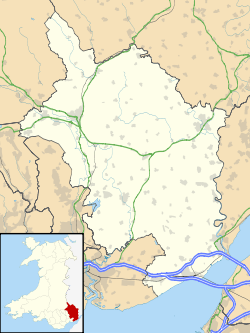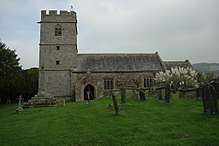Cwmcarvan
Cwmcarvan
| |
|---|---|
 Countryside at Cwmcarvan, pictured from the top of the church tower | |
 Cwmcarvan Cwmcarvan shown within Monmouthshire | |
| OS grid reference | SO476075 |
| Principal area | |
| Ceremonial county | |
| Country | Wales |
| Sovereign state | United Kingdom |
| Post town | MONMOUTH |
| Postcode district | NP25 |
| Dialling code | 01600 |
| Police | Gwent |
| Fire | South Wales |
| Ambulance | Welsh |
| EU Parliament | Wales |
| UK Parliament | |
Cwmcarvan (Welsh: Cwmcarfan) is a small rural village in Monmouthshire, south east Wales. It is located 4 miles south west of Monmouth and about 4 miles east of Raglan, off the old A40 road not far from Trellech.
History and amenities

Church of St. Catwg
The church dates from the 13th or 14th century, in the Early English and Perpendicular styles, with some 16th-century features. It was heavily restored in the 1870s.[1] The dedication is to St. Catwg or Cadoc, a Welsh saint of the 6th century. There are porches on both the south and north sides, supposedly so that the squires of Cwmbychan and Trevildu within the parish did not have to enter through the same door as each other.[2]
Craig-y-Dorth
The hill of Craig-y-Dorth, 1 mile north east of the church, was the site of a battle in 1404 between Owain Glyndŵr's rebels and English forces. According to the Annals of Owain Glyn Dwr, "Here the more part of the English were slain and they were chased up to the town gate [of Monmouth]".[3]
High Glanau
The house at High Glanau was built in 1923 for the writer and garden designer Henry Avray Tipping.[1]
References
- 1 2 John Newman, The Buildings of Wales: Gwent/Monmouthshire, 2000, ISBN 0-14-071053-1
- ↑ Sir Joseph Bradney, A History of Monmouthshire, vol.2 part 2, 1913
- ↑ Annals of Owain Glyn Dwr Archived 2011-06-05 at the Wayback Machine.
External links